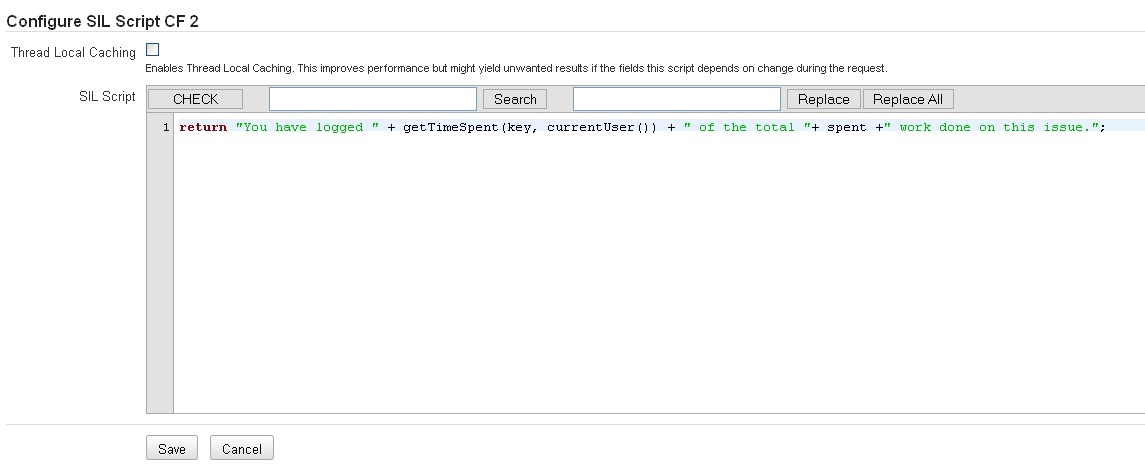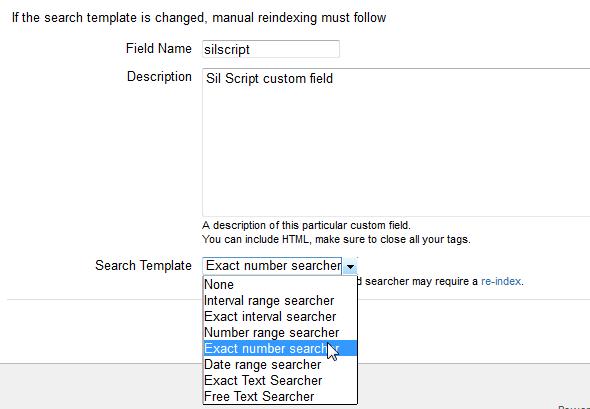PCF - SIL Script Custom Field
Contents
Recommendation
Before using SIL Script Custom Field, see Simple Issue Language documentation for a better grasp of SIL usage and capabilities.
Configuring PCF - SIL Script custom field
- After you create the field, click the Configure link for this field. You will see the page like the following example:
- Click the Edit SIL Script link to see the SIL editor.
- Click Save, and the script is associated with the current custom field.
- The value returned by the script will be the value of the custom field.
Warning
The script is read-only. Please keep the following in mind:
- You must avoid changing any issue values in the script. In fact, you can change the issue variables but they will not be changed (issue will not be saved). However, routines may have side effects.
- This field only appears on the View screen of an issue or as a column in a JQL search
Thread Local Caching
If you are not fully aware of what this implies, we recommend that you leave the option off.
Because multiple calls to get the value of a SIL Script custom field for a certain issue are inevitable, we implemented an option to generate the value only once per HTTP request. This can improve performance, but might have some side effects.
For instance, if the value is generated before some other values it depends on are modified, the result might not reflect the latest updates.
Using PCF - SIL Script custom field
This is how the field displays the value returned by the script.
Examples
Seeing Issue Age
interval age = currentDate() - created; return "This issue is " + age + " old";
Showing the number of subtasks for a ticket
number noSubtasks = size(subtasks(key)); return "This issue has " + noSubtasks + " subtasks";
Showing average age for issue subtasks
date now = currentDate(); // just to make sure we use the same reference date
string [] subtasks = subtasks(key);
interval age;
for(string task in subtasks){
age = age + (now - %task%.created);
}
return "Average age of subtasks is " + (age / size(subtasks));
Displaying results from the database
//select the city from the specified region
return sql("TestSQL", "select city from cities c, district d, region r where c.iddistrict=d.id and d.idregion=r.id and r.region='Bucharest'");
Seeing how long a ticket is in the particular status
string field_name = "status";
string[] field_history = fieldHistory(key, field_name);
number n = arraySize(field_history);
date startDate;
if (n > 0) {
startDate = arrayGetElement(field_history, n - 2);
return "Current issue has been " + status + " for " + (currentDate() - startDate);
}
return "Current issue has been " + status + " for " + (currentDate() - created);
Displaying statuses count for a ticket
string[] statuses;
string[] statusHistory = fieldHistory(key, "status");
for(number i = 1; i < size(statusHistory); i = i + 2) {
string statusStr = getElement(statusHistory, i);
statuses = addElementIfNotExist(statuses, statusStr);
}
return size(statuses);
Seeing everyone who has ever been an Assignee for the ticket
string[] assignees;
assignees = addElementIfNotExist(assignees, userFullName(assignee));
string[] assigneeHistory = fieldHistory(key, "assignee");
for(number i = 1; i < size(assigneeHistory); i = i + 2) {
string assigneeName = userFullName(getElement(assigneeHistory, i));
assignees = addElementIfNotExist(assignees, assigneeName);
}
return assignees;
Making SIL Script custom fields searchable
- Log into your Jira as Admin.
- Go to Administration > Custom fields, and click Edit for the necessary SIL Script custom field.
- Select a Search Template for that custom field according to the value type returned by it.
- If you are about to add a new SIL Script custom field, you can choose the Search Template at the custom field creation step.
- After changing the Search Templates for all the custom field that you want, perform a re-index in Jira for the search to work fine.
After you set a searcher for the SIL Script custom field, you can perform a search for all issues containing the desired value for that custom field.
See also
For more details on searching issues in Jira, see Searching for Issues tutorial from the Jira documentation.



